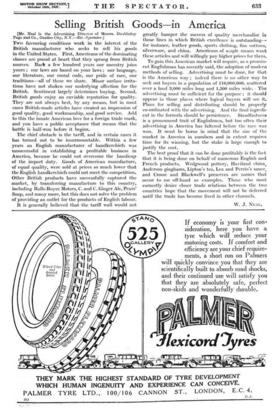Selling British Goods—in America
[Mr.. Neal is tho Advertising. Director of Messrs. Doubledsy
Page and Co., Garden City, N.Y.—ED . Spectator.] Two favouring conditions work in the interest of the British manufacturer who seeks to sell his goods in the United States. First, Americans of the dominating classes are proud at heart that they sprang from British sources. Back a few hundred years our ancestry joins yours ; our laws are based on your laws ; our language, our literature, our moral code, our pride of race, our traditions—all of these we share. Minor surface irrita- tions have not shaken our underlying affection for the British. Sentiment largely determines buying. Second, British goods enjoy an enviable reputation for quality. They are not always best, by any means, but in most eases British-made articles have created an impression of good quality, good workmanship, and good service. Add to this the innate American love for a foreign trade mark, and you have a public acceptance that means that the battle is half-won before it begins. - The chief obstacle is the tariff, and in certain cases it has turned out to be insurmountable. Within a few years an English manufacturer of handkerchiefs was unsuccessful in establishing a profitable business in America, because he could not overcome the handicap of the import- duty. Goods of American manufacture, of equal quality, were sold at prices so much lower that the English handkerchiefs could not meet the competition. Other British products have successfully captured the market, by transferring manufacture to- this country, including Rolls-Royce Motors, C. and C. Ginger Ale, Pears' Soap, and many more, but this does not solve the problem of providing an outlet for the products of English labour.
It is generally believed that the tariff wall would not greatly hamper the success of quality merchandise in those lines in which British excellence is outstanding-- for instance, leather goods, sports clothing, fine cottons, silverware, and china. Americans of ample means want these articles and will willingly pay higher prices for them.
To gain this American market will require, as a promin- ent Englishman has recently said, the adoption of modern methods of selling. Advertising must be done, for that is the American way ; indeed there is no other way to seek out buyers in a population of 110,000,000, scattered over a land 3,000 miles long and 1,500 miles wide: - The advertising must be sufficient for the purpose ; it should appear in those places where logical buyers will see it. Plans for selling and distributing should be properly co-ordinated with the advertising. And the final ingredi- ent in the formula should be persistence. Steadfastness is a pronounced trait of Englishmen, but too often their advertising in America has faltered before the race was won. It must be borne in mind that the size of the market in America in numbers and in extent requires time for its winning, but the stake is large enough to justify the cost.
The best proof that it can be done profitably is the fact that it is being done on behalf of numerous English and French products. Wedgwood pottery, Haviland china, Anderson ginghams, Lipton's tea, Lea and Perrin's 'sauce, and Crosse' and Blackwell's preserves are names that occur to me off-hand as examples. Those who most earnestly desire closer trade relations between the two countries hope that the movement will not be deferred until the trade has become fixed in other channels.
W. J. NEAL.


















































 Previous page
Previous page